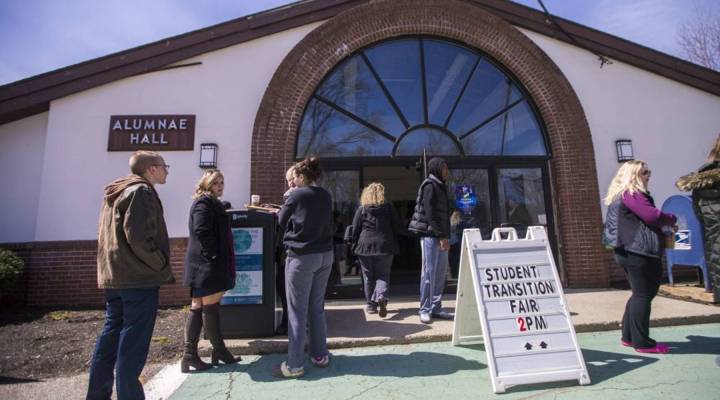
Small college closures can leave students in a bind as they seek to finish a degree
Small college closures can leave students in a bind as they seek to finish a degree

About five small private colleges close their doors in the U.S. every year according to Moody’s Investors service. One of the latest is Mount Ida College, a school with about 1,500 students in the Boston area. The news left many students and parents like Chris Connolly, wondering why they didn’t see this coming.
“My daughter is a freshman in the photography program working for her bachelor’s degree,” explained Connolly. “The rug was just pulled out from underneath of her.”
Connolly was one of dozens of parents who showed up at a recent Board of Higher Education meeting about the closure of the school and what it means for their kids. The University of Massachusetts Amherst is finalizing a deal to buy the college. And students in good standing will be allowed to transfer to one of the state college system’s campuses, but not all of Mount Ida’s majors are offered there.
“We keep running into roadblocks,” she said. “There’s nothing that matches what she signed up for.”
Other state schools are now stepping up to take over some of Mount Ida’s specialized programs but many students are still left without a clear path forward. So is there anything consumers can do to avoid getting stuck in limbo like this?
Tolani Britton, who teaches higher education economics at Harvard explained the answer is both yes and no. She said it’s a yes because all private colleges are issued Financial Responsibility Composite Scores by the U.S. Department of Education.
“It’s a single number as opposed to a financial report that you have to decode or decipher,” Britton said.
The composite scores look at factors like whether the school can cover its expenses and if its operating within its means. Lower scores signify financial problems. Which sounds helpful, but Britton added, “This score doesn’t actually have good predictive power.”
Mount Ida, for example, consistently scored above the danger zone even though it was millions of dollars in debt. Britton also noted many schools that got low grades in past years haven’t closed. The issue, explained Melissa Emrey-Arras with the U.S. Government Accountability Office, is that the formula has not been updated in 20 years.
“The times have changed and there are new metrics that are helpful to consider,” Emrey-Arras said.
In response to a GAO report the Department of Education said that it stands by its accounting practices though it is convening a committee to review the formula. And, Emrey-Arras added students shouldn’t completely write off the scores.
“Even though this is not the most accurate tool, it is still a useful indicator,” she said.
Mount Ida officials have not made themselves available for interviews since the announcement of the closure in early April, but at the time college president, Barry Brown, said in an email to students that “The financial pressure on small colleges has never been greater, and our limited resources obligate us to consider the long-term future of our community.”
Mount Ida officials have established a hotline to help students navigate their options.
There’s a lot happening in the world. Through it all, Marketplace is here for you.
You rely on Marketplace to break down the world’s events and tell you how it affects you in a fact-based, approachable way. We rely on your financial support to keep making that possible.
Your donation today powers the independent journalism that you rely on. For just $5/month, you can help sustain Marketplace so we can keep reporting on the things that matter to you.


















